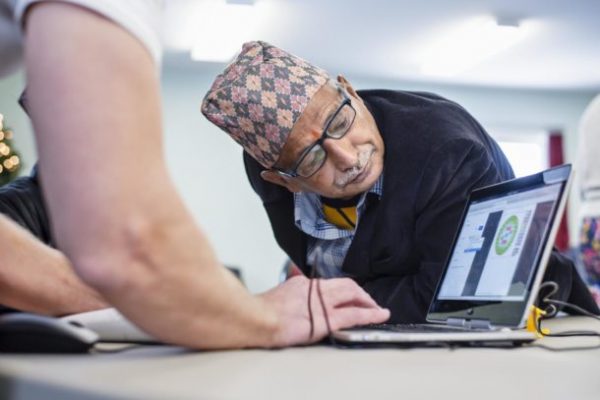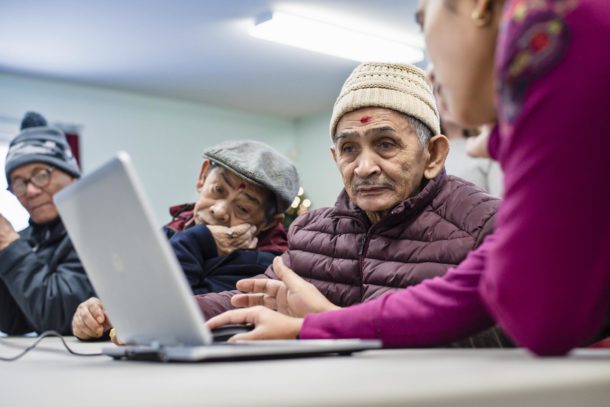Technology lessons promote community for older new Americans – vtdigger.org

WINOOSKI — On one of the first snowy mornings in November, a group of elderly Bhutanese new Americans made their way into the Winooski Senior Center. They greeted staff members with bows and “namastes,” and headed to the back of the building where the day’s lesson was about to begin.
On a computer screen in the front of the room was a mandala, a sacred shape in Buddhist and Hindu religions, and a reminder of home for many of the elderly Bhutanese refugees living in Winooski. That day, they were coloring — with a twist.
The coloring was taking place on computers provided to the Senior Center by Technology for Tomorrow, or T4T, a nonprofit that aims to connect those in need with affordable technology. T4T has partnered with Age Well, a nonprofit that provides services for the elderly in northwestern Vermont, to hold technology teaching sessions specifically for Winooski’s refugee population. Winooski is one of the most diverse cities in Vermont, largely due to refugee resettlement.
The goal of the program is to help refugees break through loneliness as they’re navigating a new culture in the United States, said Bjorn Norstrom, program manager for T4T.
“Typically senior citizens in general can become isolated pretty quickly by just staying in their home,” Norstrom said. “It’s about getting people out and away from isolation to experience a sense of community.”
In this round of sessions, funded by Agency of Human Services grants, new Americans are learning how to navigate laptops. In previous sessions, they worked with cell phones, including learning how to take pictures with them.
In addition to teaching technology skills, the sessions give refugees a chance to practice their English. Before the virtual coloring began, Norstrom worked the room, holding up signs that read “keyboard” and “mouse” to encourage participants to practice laptop vocabulary. Many of them knew only fractured English.
Some dismissed the mandala coloring module and opened up a new window to surf YouTube. They quickly found videos in their native language with scenes from home in Bhutan. Hannah McKelvey, a student volunteer from St. Michael’s College, said she didn’t mind letting them get distracted before encouraging them back to the mandala.
“It brings them a familiarity of a culture that isn’t a huge part of this community,” McKelvey said. “They can’t go back. But this can bring them a virtual comfort and familiarity.”
VTDigger is underwritten by:
Some students got frustrated. There was only one translator in the room, and as participant Pema Lama Sherpa said, it can be difficult to navigate the computers without knowing English. Many of the new Americans participating weren’t literate in their native language before coming to the United States.

But the coloring is fun, Lama Sherpa said, through his translator, Namgay Dema Sherpa, who is also a refugee from Bhutan and now works as a meal coordinator with Age Well. As the only refugee in attendance who knew English and Bhutanese fluently, her role includes many more responsibilities beyond planning meals.
Dema Sherpa said she left Bhutan with her family in the 1990s to escape cultural persecution in the country. During that time period, ethnic Nepali minorities were oppressed in the country by the Bhutanese government in order to preserve the political dominance of the ethnic Drukpa majority, causing many of the Nepali minorities to flee. Dema Sherpa and her family resettled in Winooski in 2016.
Picking up new skills can be hard for the older Bhutanese community members, Dema Sherpa said. But despite their perceived stubbornness, she said she knows they’re intrigued by the new technology.
“They’re kind of old, and are like ‘What are we doing learning at this age?’” Dema Sherpa said. “They can get maybe scared… But now that they know they can color on computers, I see they’re excited, and their happy faces.”
The laptop technology sessions will continue to run weekly until the end of the year, Norstrom said, until the funding dries up. He said he’s hoping AHS will give T4T and Age Well another grant to keep the program running. In the meantime, T4T is also collecting donations to keep holding these sessions in the future.






